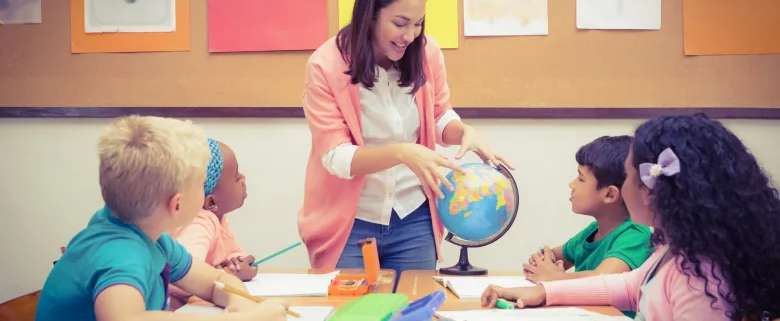The Role of Early Childhood Educators in Child Development
Early childhood education is the foundation of lifelong learning, social skills, and emotional development. At the core of this essential stage in a child’s life are early childhood educators—professionals who provide a nurturing and stimulating environment that supports every child’s growth. This blog explores the crucial role of these educators, the qualities that make them effective, and why selecting the right educational environment is so important for a child’s well-being.
The Importance of Early Childhood Educators
Early childhood educators have a profound impact on child development. They lay the groundwork for a child’s cognitive, social, and emotional growth, setting the stage for future success. Skilled educators can create a safe, engaging space that encourages curiosity and learning, providing children with the skills needed to succeed both academically and socially.
Research shows that positive interactions with early childhood educators improve children’s language development, attention span, and resilience. When educators model respect, empathy, and patience, children learn these essential social and emotional skills. This foundation helps them adapt to school environments, navigate relationships, and manage challenges with confidence.
Key Qualities of Effective Early Childhood Educators
Selecting a program with high-quality educators can be challenging. Here are the essential qualities parents should look for:
- Empathy and Patience: A great educator demonstrates empathy and patience, understanding that each child develops at their own pace. Children in these supportive environments feel valued, building self-esteem and resilience.
- Creativity and Adaptability: Effective educators tailor activities to each child’s unique needs and interests, fostering creativity and helping children develop problem-solving skills. Their flexibility allows them to adapt lessons to suit a diverse classroom, keeping each child engaged and learning.
- Strong Communication Skills: Clear communication helps educators connect with children, parents, and colleagues. An educator who communicates well can explain concepts in ways that young minds understand and is receptive to parents’ questions and concerns.
- Commitment to Lifelong Learning: Educators who stay updated on early childhood education trends bring the latest research and techniques to their classrooms. This commitment to professional growth ensures that children benefit from the most effective teaching methods.
Social and Emotional Growth Supported by Educators
Social and emotional growth is essential to a child’s overall development. In early childhood, children learn about relationships, empathy, and managing emotions. Skilled educators support this growth by guiding children through experiences that help them understand and express their feelings.
Educators encourage social skills by promoting sharing, turn-taking, and teamwork. In group activities, children practice these skills in a supportive setting, building confidence and the ability to communicate effectively with peers. Additionally, when educators model positive behaviors, children learn to navigate their emotions and develop empathy for others.
Tips for Parents: Choosing the Right Early Childhood Educator
Choosing an early childhood program is a big decision, but the right choice can make a significant difference in a child’s development. Here are some practical tips for parents:
- Observe the Classroom Environment: Visit potential programs to observe educators and students in action. Look for a welcoming, organized, and stimulating environment that encourages exploration and creativity.
- Ask About Teaching Methods: Find out what teaching methods the educators use and whether they adapt activities for different learning styles. For instance, programs that emphasize play-based learning are often beneficial, as play is a natural and engaging way for children to learn.
- Review Educator Credentials and Training: Inquire about educators’ backgrounds, training, and certifications. Those with specialized training in early childhood education are more likely to be equipped with the skills needed to support various developmental stages.
- Communicate Your Child’s Needs: Share your child’s strengths, challenges, and interests with potential educators. A responsive educator will take this information into account, tailoring their approach to suit your child’s unique needs.
Collaborative Efforts Between Parents and Educators
Effective early childhood education is a partnership between educators and parents. When educators and parents communicate openly, children benefit from consistent support at home and school. This collaboration ensures that any challenges are addressed promptly and helps create a well-rounded learning experience.
Parents can support this relationship by staying informed about classroom activities, participating in school events, and discussing their child’s progress with educators. Together, parents and educators can provide a supportive environment that promotes continuous growth and development.
Long-term Benefits of Quality Early Childhood Education
Investing in a high-quality early childhood education program offers numerous long-term benefits for children. These programs not only enhance academic preparedness but also foster essential life skills. Children who receive strong support in early education are more likely to:
- Excel Academically: A solid foundation in early literacy, math, and critical thinking skills prepares children for the rigors of primary school and beyond.
- Develop Strong Social Skills: Early experiences in a structured, collaborative environment teach children how to work in teams, handle conflicts, and communicate effectively—skills essential for building healthy relationships throughout life.
- Cultivate Emotional Intelligence: Learning to recognize and manage emotions early on helps children develop resilience and empathy, preparing them to navigate life’s challenges with greater ease.
- Show Independence and Confidence: With encouragement from nurturing educators, children become more independent and self-assured, developing confidence in their abilities and a love for learning.
Conclusion
Early childhood educators play a pivotal role in nurturing young children’s growth across all areas of development. The right educator can provide the foundation for lifelong learning, positive social relationships, and emotional well-being. At CCAMO, we understand the importance of selecting educators who possess the qualities needed to support and inspire your child. With this guidance, parents can make informed decisions about their child’s educational journey, choosing programs and educators that align with their family’s values and goals for their child’s future.
FAQ
What qualities should I look for in an early childhood educator?
Seek an educator with empathy, patience, excellent communication skills, creativity, and adaptability, along with a dedication to professional growth. These qualities foster a supportive, enriching environment for young learners.
How do early childhood educators impact social skills?
Educators guide children in sharing, cooperating, and using positive communication, which fosters essential social skills. These experiences help children build meaningful relationships and practice constructive social interactions.
What teaching methods are most effective for early childhood development?
Play-based, interactive teaching methods work best for young children. Through hands-on exploration and discovery, these methods make learning enjoyable and help children develop essential cognitive and social skills.
How can I assess the quality of an early childhood program?
Evaluate program quality by observing the classroom setting, reviewing educator qualifications, and ensuring teaching methods align with your child’s needs. A nurturing, well-organized environment supports comprehensive early development.
What role do early childhood educators play in emotional development?
Educators guide children in understanding emotions by modeling kindness and teaching empathy. This safe space allows children to express themselves and develop emotional awareness through supportive interactions.
How can I support my child’s development alongside their educators?
Stay engaged with your child’s learning by regularly communicating with educators, participating in school activities, and reinforcing academic and social skills at home for well-rounded growth.




